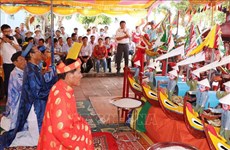Balancing land ownership in Vietnam
The revised 2003 Land Law was adopted by the National Assembly by 89 per
cent of votes. Nguyen Si Dung, Vice Chairman of the NA Office, spoke
with Ha Noi Moi (New Ha Noi) about how the law will be implemented.
The revised 2003 Land Law was adopted by the National Assembly by 89 per
cent of votes. Nguyen Si Dung, Vice Chairman of the NA Office, spoke
with Ha Noi Moi (New Ha Noi) about how the law will be implemented.
* During the implementation of the law, what issues need special treatment?
The revision of the 2003 Land Law was long and carefully drafted. However, the issues of land acquisition and land evaluation were the hottest issues. As a result, the treatment procedures of these two issues were carefully regulated in the new law. However, I can't say right now how these two issues will be handled in reality.
Under the new law, the scope of land acquisition is limited in accordance to the spirit of the new Constitution. That is, land acquisition will only be applied to socio-economic development projects for the interests of the nation and the community. Land compensation prices must follow the laws.
However, a very important additional condition attached to such a mechanism deals with the harmonisation of the interest of concerned parties, particularly the land owner.
* Will you please further elaborate on the idea of "the interest of the nation and the community"?
In many countries, only the court has the right to decide the phrase "for the interests of the nation and community." They will come up with a definition of the phrase through the trial of land disputes, in real life.
However, in the case of our country, the Standing Committee of the National Assembly is the organisation invested with the right to apply the definition of the phrase. Based upon the definition from the NA Standing Committee, it will further be explained in guiding documents on how to implement the law. So, in my opinion, if we don't have a thorough understanding of the phrase, it is likely that disputes and petitions will continue to arise.
* What about the land evaluation issue?
Under the new law, the Government is invested with the right to land evaluation with very detailed and demanding procedures. Opinions from independent evaluation agents will be important considerations on deciding the compensation price. However, in real life, land owners always want to have high prices, versus the project owners. That's why, in my opinion, we should establish a land evaluation council with the participation of various agencies, including that from an independent agent.
* Why don't we do the land evaluation based upon the consensus between the land owner and the project owner?
Consensus is a good option between disputes. However, in reality, this method is not workable due to the prolonged process, sometimes an endless process, for the two parties to reach consensus.
In addition, the acceptance of consensus means the acceptance of private land ownership. As in our country, land belongs to the people, and the State acts as the land owner and manager on behalf of the people. A sensible way to deal with this issue, and I myself favour the idea, is establishing an evaluation council. Of course, such a council must have at least three to five members.
* If the independent evaluation council is established, what operational procedures must it follow?
Of course, the council will be established when it is approved by law. However, before that we have to see if there are many good land evaluators in Viet Nam . If not, we must determine how we can train them. When we have the personnel ready, we'll discuss the establishment of the council and legal matters about the operation of the council, to make sure its operations are fair.
Another thing we cannot forget is to prepare for the worse case, of people continuing to lodge complaints and petitions on the issue of land compensation.
* Do you have any comments about the so-called "group of interest" during the process of land acquisition?
In whatever situation, the "group of interest" always exists. The key issue here is the practice of transparency and accountability and keeping the interest of balance between the parties. If we have transparent procedures on land acquisition and compensation, I'm confident that we will be the winner in the fight against the "group of interest."
* How about the issue of supervision in the implementation of the new Land Law?
That task belongs to the National Assembly. The first supervision activity is to look at how the law is implemented. Then, later on, the NA may conduct topic supervision missions. Of course, on-the- spot supervisors are the people affected by acquisition decisions.
Other groups of supervisors we cannot forget to mention are media workers.-VNA
* During the implementation of the law, what issues need special treatment?
The revision of the 2003 Land Law was long and carefully drafted. However, the issues of land acquisition and land evaluation were the hottest issues. As a result, the treatment procedures of these two issues were carefully regulated in the new law. However, I can't say right now how these two issues will be handled in reality.
Under the new law, the scope of land acquisition is limited in accordance to the spirit of the new Constitution. That is, land acquisition will only be applied to socio-economic development projects for the interests of the nation and the community. Land compensation prices must follow the laws.
However, a very important additional condition attached to such a mechanism deals with the harmonisation of the interest of concerned parties, particularly the land owner.
* Will you please further elaborate on the idea of "the interest of the nation and the community"?
In many countries, only the court has the right to decide the phrase "for the interests of the nation and community." They will come up with a definition of the phrase through the trial of land disputes, in real life.
However, in the case of our country, the Standing Committee of the National Assembly is the organisation invested with the right to apply the definition of the phrase. Based upon the definition from the NA Standing Committee, it will further be explained in guiding documents on how to implement the law. So, in my opinion, if we don't have a thorough understanding of the phrase, it is likely that disputes and petitions will continue to arise.
* What about the land evaluation issue?
Under the new law, the Government is invested with the right to land evaluation with very detailed and demanding procedures. Opinions from independent evaluation agents will be important considerations on deciding the compensation price. However, in real life, land owners always want to have high prices, versus the project owners. That's why, in my opinion, we should establish a land evaluation council with the participation of various agencies, including that from an independent agent.
* Why don't we do the land evaluation based upon the consensus between the land owner and the project owner?
Consensus is a good option between disputes. However, in reality, this method is not workable due to the prolonged process, sometimes an endless process, for the two parties to reach consensus.
In addition, the acceptance of consensus means the acceptance of private land ownership. As in our country, land belongs to the people, and the State acts as the land owner and manager on behalf of the people. A sensible way to deal with this issue, and I myself favour the idea, is establishing an evaluation council. Of course, such a council must have at least three to five members.
* If the independent evaluation council is established, what operational procedures must it follow?
Of course, the council will be established when it is approved by law. However, before that we have to see if there are many good land evaluators in Viet Nam . If not, we must determine how we can train them. When we have the personnel ready, we'll discuss the establishment of the council and legal matters about the operation of the council, to make sure its operations are fair.
Another thing we cannot forget is to prepare for the worse case, of people continuing to lodge complaints and petitions on the issue of land compensation.
* Do you have any comments about the so-called "group of interest" during the process of land acquisition?
In whatever situation, the "group of interest" always exists. The key issue here is the practice of transparency and accountability and keeping the interest of balance between the parties. If we have transparent procedures on land acquisition and compensation, I'm confident that we will be the winner in the fight against the "group of interest."
* How about the issue of supervision in the implementation of the new Land Law?
That task belongs to the National Assembly. The first supervision activity is to look at how the law is implemented. Then, later on, the NA may conduct topic supervision missions. Of course, on-the- spot supervisors are the people affected by acquisition decisions.
Other groups of supervisors we cannot forget to mention are media workers.-VNA













